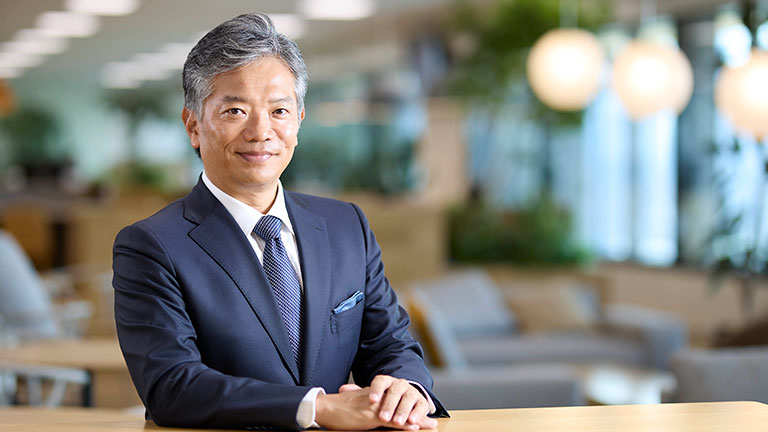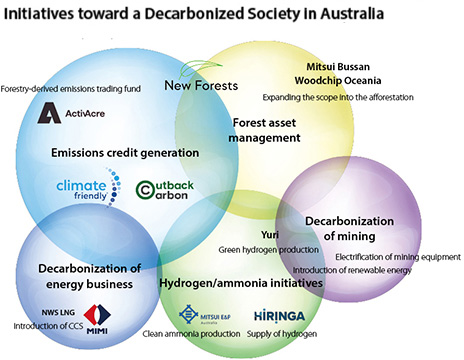CSO Message


Mitsui’s business portfolio configurations are highly flexible and versatile. By leveraging this, we will strive to engage in business initiatives that deliver a substantial positive impact on social issues.
Representative Director,
Senior Executive Managing Officer
Chief Strategy Officer
Makoto Sato
This Integrated Report highlights the links between growth strategies and corporate value enhancement and positions the improvement of the business portfolio as the key to corporate value enhancement. What are your views on the business portfolio?
At Mitsui, we have set Key Strategic Initiatives in accordance with the operating environment, and over the course of many years have built core businesses in numerous industries. As a result, we have developed the ability to create many portfolio configurations spanning multiple business domains.
Although “selection and concentration” has been a widely used phrase in Japan since the late 1990s, as a sogo shosha (general trading company), Mitsui has pursued strategies that are the opposite of this concept. In today’s highly volatile business environment, having a diverse portfolio has a decentralizing effect and enhances our risk resilience and competitive advantage. We can offer real solutions to complex social issues, such as climate change, not simply because we own multiple businesses and have formed business clusters, but rather because we make strategically optimal selections from an expansive range of potential configurations.
Our ability to build a portfolio flexibly from this diverse array of business domains is linked to our corporate culture and organizational design. Mitsui’s highly individual and creative employees, who constantly work to enhance their skills, collaborate and cooperate closely and open-mindedly across organizations – a process facilitated by low barriers between business units. Our business unit system and global matrix structure may seem complicated at first glance, but this organizational design is ideal for discovering customer needs and providing real solutions by combining elements across multiple industries. This organizational structure can also tap into Mitsui’s open-minded corporate culture that allows bottom-up and middle-out business proposals.
What are your thoughts on achieving both social and economic value and sustainability?
I believe that Mitsui creates social value in part by providing solutions for social issues. Because social issues change over time and the social value that we are expected to provide also changes, we always look ahead and try to anticipate the future to propose effective solutions to complex issues affecting our customers. For example, the reduction of Scope 3 GHG emissions needs to be addressed across entire value chains, and there is a limit to what can be achieved by a single company. Mitsui therefore works with stakeholders from the upstream to downstream stages of value chains and combines these efforts to create innovation.
Sustainability initiatives are vital to the solution of long-term social issues. Takashi Masuda, the first president of the former Mitsui*, said “Let not short-term gains tempt your mind, seek only enduring prosperity by embracing grand aspirations.” I am confident that the Mitsui of today, which has inherited that ideal, can be the best partner for our customers in addressing issues related to sustainability.
In pursuing sustainability initiatives, we need to be impactful at the very core of our businesses, in the areas of business, countries, and regions where we have a significant presence. In that way, we can provide genuine and real solutions to social issues while also creating economic value from a long-term perspective.
Can you provide some examples of Mitsui’s unique ability to create both social and economic value?
Our global next-generation fuel projects and our activities in Australia are typical examples unique to Mitsui. What’s common to these examples is that, by anticipating future trends, proactively reconfiguring our business portfolio, and combining strengths across multiple industries, we are providing real solutions to climate change while also creating economic value.
Iron ore, metallurgical coal, LNG, and natural gas are perhaps the first things that come to mind when people think about Mitsui’s business activities in Australia. While these core businesses contribute to Mitsui’s economic value, it is also true that they have high Scope 3 GHG emissions. Amid heightening attention to climate change as a social issue in recent years, Mitsui is determined to take the lead in efforts toward a decarbonized society spanning entire supply chains. We have also strengthened our climate change initiatives in Australia, where we have a significant presence.
For example, drawing on the experience and knowledge we gained through the years of our involvement in the wood chip business, we have expanded into the forest asset management and forestry-derived emissions fund business. Further, in the energy domain, we are looking at the introduction of CCS and the production of clean ammonia. As to the mining business, we are also considering green hydrogen production near mining sites. In addition, given that Australia is ahead of the world in emissions trading, we are currently working on the emissions credit generation businesses.
Through initiatives such as these, Mitsui is ensuring the sustainability of the core businesses that support economic value today, while also pursuing long-term social and economic value by providing real solutions to social issues.

What are your views on the Roadmap to Net-zero emissions by 2050?
Mitsui has adopted a vision of achieving Net-zero emissions by 2050. As a milestone toward that vision, we aim to halve our GHG impact by 2030 compared with the fiscal year ended March 2020. Using Mitsui Investor Day and other opportunities, we have informed our stakeholders about our roadmap to 2030, including its progress status. We have already executed multiple business initiatives that will have a direct impact on social issues, and to inform stakeholders about the long-term policies that have emerged as a result of these initiatives, we have recently created our Roadmap to Net-zero emissions by 2050. Sustainability initiatives require actions as well as targets, so we will give specific examples to convey our progress.
* From a legal perspective, there is no continuity between the former Mitsui and the present Mitsui, and they are totally separate entities.